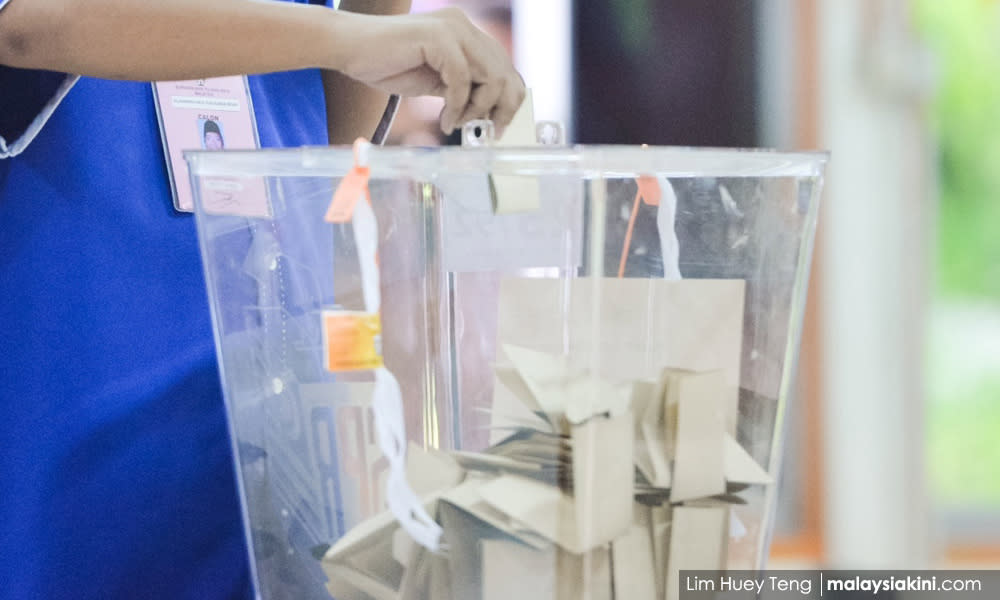Sack or keep? Bersih to stage mock recall election using Tebrau as model

In recognition of increased voter frustration and helplessness in the face of the sometimes fickle loyalties of their elected representatives, the Coalition for Clean and Fair Elections (Bersih 2.0) is set to stage a mock recall election using Tebrau as a model.
A recall election is an electoral mechanism that allows voters to petition for a mid-term election to try and remove or sack the elected representative of their constituency if they are unhappy with the actions or performance of that person, Bersih chairperson Thomas Fann told Malaysiakini in an e-mail interview.
California Governor Gavin Newsom is set to face one later this year and Arnold Schwarzenegger ascended to the same office after his predecessor Gray Davis was voted out in a recall election in 2003.
However, Fann says the biggest inspiration for such a move comes from closer to home.
"The biggest motivation for Bersih 2.0 to advocate for recall elections is our own Sheraton Move that took place over 16 months ago. The political coup that took place through the defections of MPs exposes very serious weaknesses in our existing laws and political system.
"Bersih decided to focus on identifying what are some of these direct and indirect weaknesses and advocate for sustainable reforms that would strengthen our parliamentary democracy.
"Party hopping happened because currently there are no prohibitions or even deterrence for an elected representative to defect for whatever reason and, as what we witnessed during the Sheraton Move, with devastating consequences leading to the collapse of the federal government and six state governments in less than 10 months," said Fann.

He said the impetus to run a Simulated Recall Election (SREL) campaign came after the second wave of defections earlier this year with Terbrau MP Steven Choong and Julau MP Larry Sng defecting from PKR to align with PN.
"We saw the frustration of voters from those constituencies and decided to work with our technology partner ReGov Technologies to develop this SREL on an e-voting platform.
"Our brief to ReGov was that this system must be good enough for an actual election and we are pleased to say that we have just such a system," he added.
Fann said the electoral roll for the 14th general election was stored in Bersih's system and only verified voters from the targeted constituency can vote.
"Our system does live facial verification using images from the person's MyKad and a selfie to authenticate the identity of the person plus a one-time password (OTP) sent to the person's handphone.
"We are excited with the prospect of running the first-ever SREL in Malaysia but also the first on a secure and reliable e-voting system," said Fann, who is planning to launch the campaign tomorrow.

The electoral watchdog body said it is inviting the Election Commission to observe and consider utilising this technology in the future, especially for Malaysians who are overseas or out-of-region during elections.
Fann said that political instability will be the new norm of Malaysian politics if certain reforms are not carried out and voters only have the opportunity to vote every five years or so when a general election is called or during a snap election before the full term or during a by-election triggered by the death of an elected representative or due to resignation.
He pointed out that even if Malaysia had an anti-party hopping law, it would not entirely address what happened during the Sheraton Move when a whole party - Bersatu - defected out of a coalition to be with the new government.
"On the other hand, the recall election is not prohibitive but is a deterrent measure that would give the voters of the constituency the option to remove their MP or assemblyperson if they do not approve of his/her defection.
"Reps who won on their party ticket where the constituency is their party's stronghold will likely think twice before defecting lest a recall election is triggered to remove them.
"The recall election empowers voters mid-term and reinforces representative democracy where the voters retain the right to sack or keep their elected reps," argued Fann.
But hypothetical exercises?
The question does arise - why do Bersih and professors of political theory constantly discuss hypothetical improvements to our political process when no real change seems to manifest itself?

The ideas include recall elections, anti-party hopping laws, elections for the Dewan Negara and city councils or proportional representation instead of first-past-the-post.
There are indeed so many ideas that would improve our democratic process but they all depend on reform from the same political representatives who are responsible for the current quagmire and who are not showing any sort of commitment to improve a clearly broken system.
Fann believes that constant engagement with lawmakers is key.
"Part of Bersih 2.0's advocacy over the past one year has been to engage with politicians from all parties in getting their views on recall elections.
"We did it mostly online through private meetings, webinars and some face-to-face meetings. We are pleased to note that there is a growing acceptance for recall elections.
"Politicians are sensitive to public opinion and they would be reluctant to effect changes unless there is a groundswell of support for these reforms. As such, another reason for us to launch the SREL is to get public support for this reform and we hope to see political parties making commitments to having recall elections in their party manifestoes for GE15," he said.
Mechanics of the SREL
According to Fann, the purpose of the SREL is to give Malaysian voters a sampler of how a recall election would work if we have such a law in place.

"We commissioned a research report into recall elections and made some recommendations on how a recall election could be conducted in Malaysia, where the process is longer, needing a petition of at least one percent of registered voters in a constituency to initiate, then another 10 percent to trigger a recall election and finally a recall election where at least 50 percent of voters plus one voting 'Yes' to remove - or more voters than the elected rep received at the last election - for the recall or sacking to be successful."
For the purposes of this campaign, it has been scaled down so that voters can have an easier experience of taking part in this exercise.
Fann said interested voters can contact Bersih 2.0 to indicate their interest to initiate an SREL in their constituency.
For this campaign, only constituencies that saw their MPs or assemblyperson defecting to another party/coalition or going independent, qualify to participate.
i) Once Bersih approves the interested person or party, they will create an online link where the initiator has to collect at least three percent of registered voters of their constituency. Only registered voters for GE14 are allowed to take part as they were the voters who had voted or had the right to vote. There is no time limit to the collection of the three percent.
ii) Once the three percent has been achieved, Bersih will verify that these are genuine voters for the constituency.

iii) Bersih will then offer to host a debate between the initiator of the petition and the targeted MP or assemblyperson so that both sides have a chance to present their case as to why they should be sack or retained. If the targeted representative does not want to respond or take part in the debate, this part will be skipped.
iv) Bersih will then open up the online page for the SREL where eligible voters can vote 'Yes' or 'No' to the question, "Do you want to sack YB ____?" The polling period will last for one month.
v) At the close of polling. Bersih will then reveal the result.
If there are more 'Yes' votes than 'No' votes and if more than 10 percent of registered voters have participated, Berish will show that had there been a recall election law in Malaysia, there would be a high probability that the elected representative would be sacked and a fresh election called.


